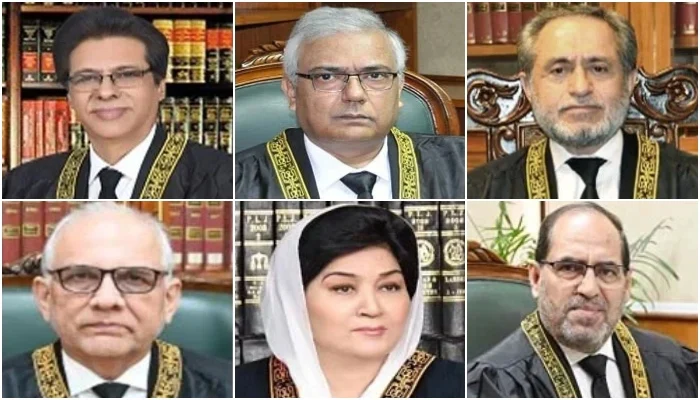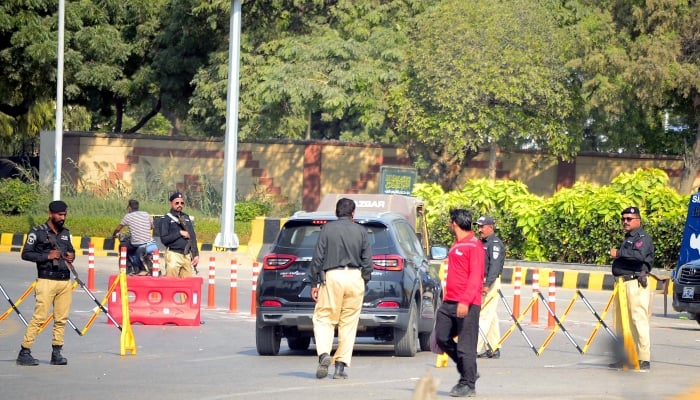The Supreme Court of Pakistan’s six-member constitutional bench initiated hearings on Thursday for cases that have been pending for several years. The hearings are being held in Court Room No. 3, marking the first session of the bench since its formation under the 26th amendment to the constitution.
Bench Composition and Case Load
The bench, presided over by Justice Amin-ud-Din Khan, includes Justices Jamal Khan Mandokhail, Muhammad Ali Mazhar, Syed Hasan Azhar Rizvi, Musarrat Hilali, and Naeem Akhtar Afghan. Due to the unavailability of Justice Ayesha A. Malik, the bench was constituted with all available judges for hearings scheduled on November 14 and 15.
A total of 34 cases are on the agenda, with 18 cases set for hearing on Thursday and the remaining 16 cases on Friday.
Key Cases Heard
The bench took up various high-profile cases, including:
- Environment-Related Cases: The bench heard matters related to environmental protection, including a longstanding case pending since 1993. Justice Muhammad Ali Mazhar emphasized the importance of addressing environmental challenges across the country, while Justice Musarrat Hilali raised concerns about unchecked construction by housing societies.
- Review Petition Against Justice Qazi Faez Isa: A petition challenging the appointment of Justice Qazi Faez Isa as Chief Justice of the Balochistan High Court was dismissed due to its ineffectiveness.
- Election Rescheduling Plea: The bench dismissed a plea seeking to reschedule the 2024 general elections, noting that the request had become irrelevant since the elections had already been conducted.
- Disqualification of Lawmakers with Foreign Assets: The bench rejected a petition seeking to disqualify lawmakers possessing foreign assets or bank accounts, citing the matter as the domain of Parliament.
Focus on Environmental Issues
During the environment-related hearings, Justice Mandokhail and Justice Hilali expressed concern over increasing pollution and unchecked urban development. Justice Mazhar questioned the role of the Environmental Protection Authority, which has been criticized for its lack of action despite longstanding issues.
The bench discussed the detrimental impact of housing societies on agricultural land and emphasized the need for sustainable urban planning, including the promotion of apartment buildings instead of sprawling housing schemes.
Dismissals and Fines
Several cases were dismissed for being ineffective, including:
- Petition on Government Employees Marrying Foreign Nationals: The petition was dismissed with a fine, as the court ruled that such regulations fall within the legislative powers of Parliament.
- Petition Against Foreign Asset Holders Running for Office: The court imposed a fine on the petitioner for presenting insufficient legal grounds.
Justice Mandokhail remarked that legislative authority lies with Parliament, and the court cannot direct it to enact specific laws.
Call for Legislative Action
Throughout the hearings, the bench underscored the separation of powers, urging petitioners to seek legislative changes through their elected representatives instead of relying on the judiciary for policy decisions.
The court concluded by consolidating related cases and postponed further hearings for three weeks, requesting comprehensive reports from all provinces on measures taken to combat environmental pollution.
This session reflects the Supreme Court’s renewed focus on clearing its backlog of pending cases while upholding the legislative domain of Parliament in policy matters.




